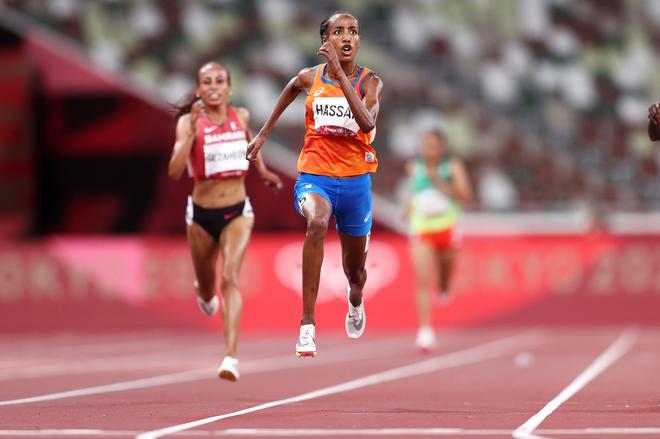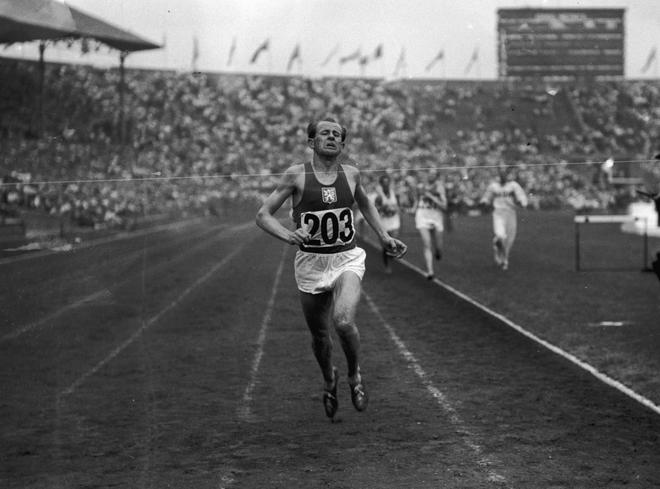

When Sifan Hassan decided to race the 1500m, 5000m and 10,000m at the Tokyo Olympics in 2021, she knew of the bewilderment she was causing among fans and other athletes. “Many people say I’m crazy,” she said. “Believe me, I think I’m crazy too.”
Several decades ago, another long-distance runner provoked astonishingly similar sentiments. Emil Zatopek, the Czech who won the 5000m, 10,000m and marathon in an eight-day stretch at the 1952 Helsinki Olympics, often caused shock and awe.
“They thought I am crazy,” Zatopek once said, describing how the crowd responded when he cycled 220 miles from Prague to Berlin and then made an abnormally fast start to win his first international race. “Who is he, they are saying? He is crazy. Crazy.”
So it’s only fitting that Hassan may try to emulate Zatopek by competing in the 5000m, 10,000m and marathon at next year’s Paris Olympics. The 30-year-old Dutch athlete, who won the Olympic 5000m and 10,000m titles (and the 1500m bronze) in Tokyo, made a stunning marathon debut in London last month, coming home first in two hours, 18 minutes and 33 seconds.
Battling adversity
On the streets of London, Hassan struggled with a painful hip, stopped to stretch her muscles, survived a close encounter with a motorbike, hesitated because she wasn’t sure where the finish line was, and still beat an incredibly competitive field that included world record holder Brigid Kosgei and Olympic champion Peres Jepchirchir.
Hassan had confessed to feeling anxious ahead of the race, even wondering why she was putting herself through the ordeal. “My feeling is nervous, and curious at the same time,” she said. “Can I defeat the marathon, or is it going to defeat me?”
After gruelling training runs without food or water during the holy fasting month of Ramadan, Hassan had said she had no particular time in mind for finishing the race. And at several points during the 42.195 km, she had doubts about even finishing the race.
“I thought I was going to stop somewhere because whenever I tried to speed up it hurt me. But I thought I should get some experience of running a marathon for the next one. Finishing 100% didn’t come into my mind.” But finish she did, and the triumph allowed her to dream big.
Hassan’s coach, Tim Rowberry, told the Algemeen Dagblad newspaper that she started talking about Zatopek’s feat after the race. Rowberry said Hassan has been pointing to the fact that no one had won the 5000m, 10,000m and marathon at an Olympics since the immortal Czech, suggesting a seed had been planted in her head. Indeed, it’s a seed that might have been planted even earlier than the aftermath of her London Marathon victory.
Back in September last year, Hassan spoke about “thinking every night and every day” about running a marathon. When asked whether she might have a tilt at the marathon at the 2024 Paris Olympics, she replied with a laugh: “Why not?”
Steps into the unknown
It’s no wonder then that she described the London Marathon as a test that was likely to inform how she approached Paris, terming it “a step into the unknown”.
Hassan, during the course of a remarkable life, has either been forced into taking or voluntarily chosen steps into the unknown.
An only child raised in Ethiopia by her mother and grandmother — her parents remained married but lived on separate farms — she was put on a plane to the Netherlands by her mother in 2008. Up to then, her childhood appears to have been an enjoyable one. “We didn’t have a car. But we could eat, it was fun, and we could buy clothes,” she said. “We actually had everything.”
The traumatic incident which prompted her being sent abroad at 15 remains a mystery, and she refuses to divulge what it was. “I have to watch out for that,” she recalled. “One day I’m happy and the next day less. That’s the nice thing about life. If everything is perfect, it would be boring.”
Life was not much better in the under-age asylum seekers’ home she was placed in Zuidlaren — she recalls crying every day. However, after her athletic prowess was recognised, she eventually came under the wing of respected coach Honore Hoedt in 2012.
Soon Hassan was winning races while also training to be a nurse. Hoedt noticed a trait in his young charge as she rose through the age groups. “She can be recalcitrant,” said Hoedt, who coached her until 2015, when she gained Dutch nationality. “She couldn’t handle loss. She locked herself up for days. A fire is ignited in her that sometimes blows in the wrong direction.”
Hassan has largely harnessed these stubborn fires to propel her athletic career to heights only a few have experienced. But her determination has also been viewed in some quarters as obstinacy, especially when it comes to her association with disgraced coach Alberto Salazar.
Hassan did little to make those questions go away when she chose Rowberry, a former assistant of Salazar’s, as her coach. She said she saw nothing amiss with Salazar, who was banned for life from coaching in 2021 by the United States Centre for SafeSport for sexual and emotional misconduct violations. Salazar was first given a four-year ban during the 2019 World Championships in Doha. Hassan duly won the 1500m-10,000m double at those championships.
“The hardest moment and pressure in my life was in Doha and I handled it,” she said. “If they want to test me, they can test me every single day. Every single day.”
If she does choose to go for gold in the 5000m, 10,000m and marathon in Paris next year, she certainly will be tested every single day. Between the 5000m heats on August 2 and the marathon on August 11 are the 5000m final on 5th and the 10,000m final on 9th: a cramped, exhausting schedule that most elite athletes consider beyond the bounds of reasonableness.
But Hassan is clearly someone who is excited by a seemingly impossible challenge. “Otherwise I find it boring,” she once said. “For me it is crucial to follow my heart.”
Is the heart pointing her in Zatopek’s direction? “I am someone who wants everything and wants to be everywhere,” she declared after her London triumph. We may just be in for another jaw-dropping dose of “crazy”.







